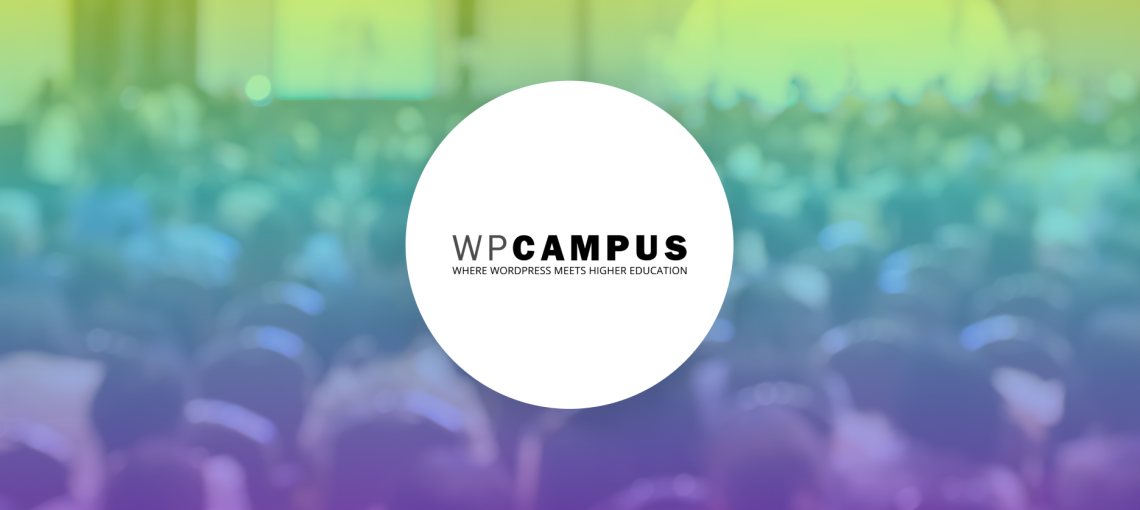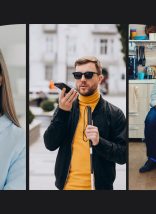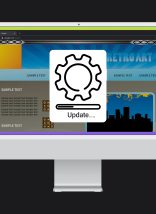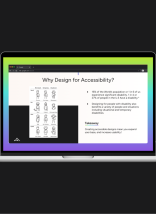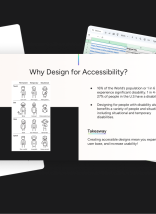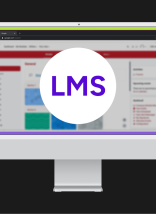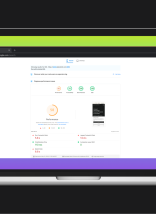We are pleased to announce Atlantic BT’s User Experience Researcher, Annie Tudora, is teaming up with Ablr’s, Accessibility Operations Manager, Kim Casey to present at WPCampus 2021 Online on Tuesday, September 21 at 10 am EST.
WPCampus is a community of web professionals, educators, and people dedicated to supporting the convergence of WordPress in higher education. This free conference will cover a variety of topics surrounding web accessibility, WordPress and higher education.
Annie and Kim’s session will focus on the benefits and challenges of online learning for people with disabilities. Annie’s personal experience with navigating higher education through the lens of a disability inspires her to advocate for accessibility for all. Kim has over two decades of experience in creating accessible products and content.
You can watch the video here or read the transcript below.
Watch her talk here – Empowering accessibility in the era of online learning.
Annie Tudora 0:00
Thank you for joining us today for our lightning talk and powering accessibility in the era of online learning. I’m Annie Tudora, a User Experience Researcher at Atlantic BT. And I have my master’s degree in user experience design from Kent State University.
Kim Casey 0:19
And I am Kim Casey, an Accessibility [Analyst] at Ablr, a digital accessibility firm that focuses on eliminating barriers for people with disabilities. And I have just over 20 years of experience developing accessible products and training resources.
Annie Tudora 0:36
So here’s a picture of me and I’m super excited in this picture. And not only because I had just graduated with my bachelor’s in film and media at Georgia State University, but also because I had just finished what was the most difficult semester of my entire college career. I spent most of my bachelor’s degree limping around campus, and something to know about downtown Atlanta where Georgia State [is located]. The classroom buildings are very far apart. So it takes about a 15 to 20 minute walk to get from building to building. And after three years, I was diagnosed with osteonecrosis, also known as bone death. And several of my bones, and my knees and my ankle, my wrist and my hip have lost circulation and are very painful, and are essentially dead. So once I found this out, I had a very hard time getting around and my knees were very painful.
So I decided to spend the last semester in a wheelchair. And I quickly found out that the campus of Georgia State University was very difficult for someone in a wheelchair. The ramps were largely not up to code, and it made it very difficult for me to get up and down places. And the sidewalks in downtown Atlanta were very bumpy and had lots of hills. So within two weeks of using the wheelchair at Campus, I injured the cartilage in my chest and I was unable to push myself any longer. That meant that I had to rely on the kindness of my fellow classmates and my teachers to get me from class to class. And while I deeply appreciate the kindness that they showed me every day, while I was at school, it also felt really frustrating and demoralizing to have to rely on everyone else to do things that I was normally able to do. Even something as simple as getting to the bathroom. And there were days that were so hard for me that I had to call my then fiance to come get me from school because I was crying.
But after graduating, I decided that film and media was probably not the best career for me with my disability. So I went back to school, and got my Master’s at Kent State University in user experience design where I knew I would be able to create online experiences that would be accessible to everyone. My degree was entirely online. So I got to work from home, from my home office. I got better grades, and the experience was virtually stress free. Right after I graduated, I was able to get a job, a remote position at Atlantic BT as a user experience researcher and that’s where I am today with these remote accommodations, it felt like I didn’t even have a disability at all.
Kim Casey 3:44
And Annie’s story is not the only one I’d like to share with you. [This is the] story of ABLR CEO, his name is John. He was diagnosed with Retinitis Pigmentosa in college, which means that your eyesight just kind of fades as you get older. We also found that he also found that it fades faster if you’re really stressed out. So once he was diagnosed, he tried to hide it and he didn’t really want to let anybody know that he was struggling with that condition. And resultantly ended up dropping out of college. So he struggled so much that he just realized that he wasn’t going to be able to make it with the way he was trying to do it at that time. He didn’t stop there though.
Thankfully, he kept traveling around and he was offered a job in Cameroon to set up a cell communications network. And he actually had an interesting experience there where they found out he was visually impaired and almost didn’t want him to go and try to talk him out of it and ended up giving him just six months to prove himself. And he did that and more in six months and so that was a great experience for him. And it gave him the motivation to return to college.
And so he applied for another new college and on the first day of orientation found himself inside a meeting hall where he was supposed to find his name tag on a table and find the correct seat. Unfortunately, he was not able to see the name tags. So he did the only thing he could think to do was reach out to the person standing next to him who happened to be the Dean of that college. And asked her to help him get to his chair and find his name tag. And she serendipitously has a child who has a disability as well and really encouraged him to embrace his disability, find out what resources are available, And to get the help he needs to succeed. And so that experience was great for him, because he was able to learn about what resources are available to people with visual impairments, and really opened up doors for him. He met his wife. He was just really able to participate in life like never before. And all sorts of new opportunities surfaced.
He ended up as CEO of ABLR, breaking down barriers for people with disabilities, so nobody else had to struggle like he did, when he didn’t know that there were resources available for him. And these stories are not unique. Globally, there are 1 billion people with a disability. And each person has their own story. Some like John struggle because they don’t know about available resources, some are embarrassed to ask for help. And like in Annie’s case, sometimes the available resources just aren’t enough. She couldn’t get from class to class, it was a real barrier.
So whether it’s a teacher only offering materials and paper format, where they’re not digitized, and a person with a visual impairment can’t read them. Or if it’s ramps, they’re just too steep, that a wheelchair can’t access, these things really can stop people from getting the most out of their education. What online learning gives you is kind of a forced condition where different resources and different learning types are available.
And so another one of my colleagues started his college career and found that none of the online learning resources were accessible. So instead of dropping out or really fighting battles with the accessibility department, he just offered to help them get their resources accessible, and it really opened their mind. And they created this partnership so that he could help them make the materials accessible, and in turn, then he got a better education. So it’s a partnership between the student and the school. And that’s how success really blossoms.
Annie Tudora 7:38
So there’s a lot of potential benefits of online learning for those with disabilities. For one, as in with my story, there’s no need to navigate campus for those with physical disabilities or visual impairments. This can be extremely beneficial if they can do things online. recorded lectures can be helpful for certain people with learning disabilities. And of course, online learning can make recording lectures and reviewing them a lot easier. And online, you’re usually provided with a digital text to support learning. And this can be easier for screen readers as opposed to a paper text. This can also be enhanced by allowing magnification capabilities, adding alternative text and level of headings. And then there are auto generated subtitles for zoom. And you can record those zoom videos and review them later.
However, just because one thing can benefit some people with disabilities doesn’t mean that it benefits everybody with disabilities. And we’ve also seen a lot of challenges in the online learning space. So for one, online learning actually decreases the visibility of disabilities. So some people might have a visible illness, if they have a wheelchair or something like that, you might be able to tell that they have a disability. But for me, if I don’t use my wheelchair, then there’s no way for you to know if I have a disability or not. And that’s what we call an invisible illness. And in a research report in 2011 found that when students with disabilities study online, they were reluctant to disclose that they had a disability even in the face of inaccessible online learning material. So online learning can actually make it harder for teachers and educators to know who has a disability and what kind of accommodations they might need. So even though zoom may supply with automated closed captioning, they can also be very subpar and confusing, which could lead to even more confusion than before, but this can be solved by providing closed captioning on recorded videos or transcripts for media with video or sound. And factors such as home distractions, social isolation, and self motivation can be difficult for many people with learning disabilities, and even if you don’t have one. An inaccessible third party software can be a problem when a professor prefers a teaching supplement outside of the materials provided by the school, which may have been vetted for accessibility.
Kim Casey 10:36
So that brings us to how accessible online learning can benefit anyone and why really, we should be looking into this. Online Learning has come a long way in terms of accessibility over the past couple of years, obviously, because of the pandemic, it’s sort of been a forced accessibility 101. But accessibility is a journey. So I think at the beginning, you kind of feel overwhelmed. It’s a lot of work. But then once you start thinking and incorporating it into your everyday life and all your regular lessons. Then it becomes something that you just maintain and nurture over the years. And with a commitment to accessibility. The benefits to everyone include; you’re building your content on a good foundation, so that you’re thinking about accessibility at the start. You’re trying to anticipate any needs that might arise from everyone in your audience, and you’re considering your audience regardless of their ability. You’re more intentional with your content. So you really are starting to think and break down, “how am I best going to reach this student?” and “how best can I present this information in a way that will help everybody learn?” And you’re also making your online or your content uniform, so that everything is the same. Everybody gets the same experience, whether it be in all digital, or if it’s a visual format. Everyone’s getting the same content, and just increasing awareness about accessibility and understanding different learning types and different needs of online learning consumption.
Annie Tudora 12:11
I believe in the social model of disability, which states that a disability is “the impact of an inaccessible socially constructed environment on a person with an impairment rather than something inherent in the person with disability”. Which means, that the problem isn’t that people have disabilities, the problem is that society and our social order hasn’t created solutions and accessible experiences for everyone. The pandemic has presented us with a unique opportunity to increase accessibility and online learning. With the correct considerations and implementations, we can give those with disabilities more opportunities than ever before. And with those implementations in place, people with disabilities will find themselves in a world where their disability doesn’t impair them in their learning or chances for success.
Here’s our work cited.
Kim Casey 13:15
And we realize that accessibility is a big subject matter. So we welcome any chance to speak with you about any questions you might have. You can contact me at kim.kc@ablr360.com. I also provided our ABLR, LinkedIn link and a QR code that will take you directly to our website if you want to find out more about digital accessibility and just creating accessible content. There’s also contact information for Annie. Her email is Annie Tudora, and that’s spelled t u d. o ra at Atlantic bt.com. The Atlantic bt website is there as well along with LinkedIn and we thank you for joining us today. It’s been our pleasure to talk about accessibility and online learning and we welcome the chance to talk with you soon. Thank you.
Anne Tudora 14:08
Bye. Thank you


